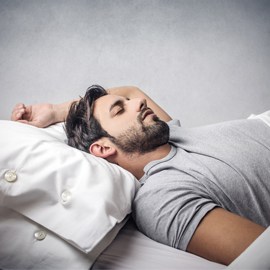
If you don’t sleep well each night, it can leave you devoid of the energy you need to make it through each day. Restless nights will make you much more apt to skip a workout and seek a quick energy boost from an unhealthy snack. Without a good night’s rest, your whole weight loss journey will be full of bleary eyes, wide yawns and a strong desire to hit the hay, and this will make things much more difficult.
Fortunately, there are many ways to help yourself get the rest you need. Sometimes, all it takes is a good hard look at your bedroom environment and sleeping habits to make a big change in the shuteye you get each night.
To get sound sleep after weight loss surgery, start by:
- Creating a sleep sanctuary. If your bedroom is too hot, too bright or constantly buzzing with distractions like electronics and pets, getting a good night’s sleep will not be an easy feat. You need to optimize your bedroom for its more important function: resting. Small additions like blackout curtains, comfortable bedding and fans can make a huge difference, so do whatever you can to make your room a place of peace and coziness.
- Getting on a schedule. Our bodies have natural sleep-wake cycles that make it much easier to fall asleep when we go to bed at the same time every night. To promote better sleep, set a bedtime and a consistent time to wake up every morning, including weekends. But if you can’t fall asleep at your scheduled time, don’t torment yourself with restless tossing and turning—get up and do something relaxing for a few minutes before trying again.
- Watching what you eat. This should be nothing new after weight loss surgery, but you may not have considered how the things you eat and drink can affect your sleep habits. Substances like alcohol, caffeine and nicotine can interfere with your ability to fall and stay asleep and are generally good things to avoid after weight loss surgery. However, even drinking water before bed can keep you up with nighttime trips to the bathroom.
To prepare yourself for healthy days after your weight loss surgery, you should shoot for between 7 and 8 hours of sleep every night.

